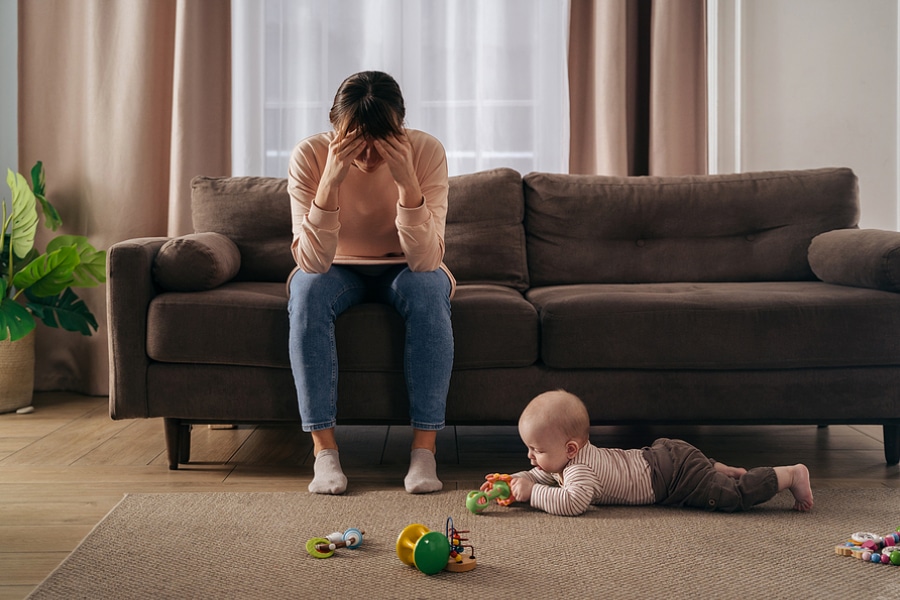Table of Contents
Giving birth is life-changing. However, for first-time mothers, taking care of a new life comes with a new set of challenges. As many as 80 per cent of new mothers state that they experience “baby blues” after giving birth. Such emotions include experiencing moments of sadness and emptiness, as well as mood swings.
In most cases, such emotions often disappear after a couple of days or weeks. However, for as many as 15 per cent of new mothers, such feelings do not go away and become worse, leading to the development of postpartum depression.
What is postpartum depression?
Commonly known as postnatal depression, it is a condition that majorly affects the way mothers view the world
and life after giving birth.
While those who experience “baby blues” experience anxiety, sadness, and mood swings, new mothers who suffer from postpartum depression goes through such emotions at a greater level. Besides these emotions, they also find it difficult to bond with their baby, think clearly, develop self-doubt, and may start to distance themselves from family and friends.
How to avoid developing postpartum depression?
It is impossible to avoid postpartum depression completely. While there are certain factors that might contribute to new mothers developing postpartum
depression, such as experiencing pregnancy-related trauma, hesitancy in having a child, and lack of a good support system, there are some steps new mothers or young parents can take to minimise the likelihood of developing postpartum depression:
- Staying healthy by having a well-balanced diet, getting enough rest, exercising where possible,
- Ensure adequate family planning,
- Building a support system that consists of trusted individuals including friends and family (as well as hired help e.g. doulas, nannies, helpers).
While you may have everything well-sorted, postpartum depression can still happen. However, that does not mean all hope is gone.
Treating postpartum depression
1. Prioritise your feelings. While taking care of your newborn, it is equally essential to take care of your own emotions when going through postpartum depression. There is no shame in getting your partner, family, and friends to help. After all, you can only give as much as you can manage.
2. Making the most out of your new stage of life. Whether or not it is your first child or not, the truth is life is different with a newborn. While there is a lot to deal with and adjust to, you need to accept changes and adapt to them.
3. Exercise more and improve your diet. It is such a cliché to say that exercise and a good diet help boost mental health, but it has been scientifically proven. Not only does adopting a good diet and exercise in your daily routine help treat postpartum depression, but it also helps in postpartum recovery. Especially for mothers who breastfeed their babies, such changes also benefit your child in a more direct way.
4. Seek therapy and community support. It is easy to avoid people and isolate yourself when going through postpartum depression. However, more often than not, speaking to someone can help with processing specific thoughts. Consider seeking private therapy or local support groups that assist with similar situations.
Conclusion
Adjusting to a new stage of life is always tricky, even if you are going through postpartum depression. However, you do not have to go through such emotions alone. Help is available when you need it, and we at A Space Between aim to fill that gap that you might be experiencing in your life.
Whether it is a new child or just about any new stage in life, our therapists at A Space Between are fully equipped and experienced to guide you through such life stages. Head over to https://aspacebetween.com.sg/therapist-directory to explore some of our available therapists today!
Tan Yeow May is a clinical psychologist with over 8 years of experience working with adolescents and adults across a variety of Government and Community settings in Western Australia and Singapore. This includes individuals within in- and out-patient hospitals, rehabilitation centres, and in prison settings. She works primarily from dynamically oriented and attachment based approaches, where her focus is on addressing underlying issues that often mask as problematic symptoms. She believes in the value of attending to core issues and the context with which one’s distress develops, lest they remain under- or unprocessed, creating other problems that can manifest in various ways later in life.
No matter what you’re facing, perhaps our website can offer up some solace or comfort. Know that you’re not alone, and that there is help available. This can be hard to keep in mind if you haven’t quite found the right support system. While it’s definitely not easy to find the right fit—whether you’re looking for a support group or a mental health provider—with diligence, it’s totally possible.
If you are a therapist, life coach or counsellor looking to join our growing community, head over to book a tour once you have learnt about the plans we offer. At A Space Between, there is a ready league of providers you can network with. With professionals from various backgrounds and therapy practices, there are bound to be the ones you can connect with. Private practice does not have to be lonely.



